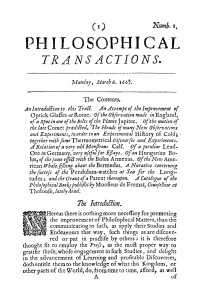JSTOR opens access to out-of-copyright articles
September 8th, 2011
 |
| Cover of the first issue of the Philosophical Transactions of the Royal Society, dated March 6, 1665. Available from JSTOR’s Early Journal Content collection. |
JSTOR, the non-profit online journal distributor, announced yesterday that they would be making pre-1923 US articles and pre-1870 non-US articles available for free in a program they call “Early Journal Content”. The chosen dates are not random of course; they guarantee that the articles have fallen out of copyright, so such distribution does not run into rights issues. Nonetheless, that doesn’t mean that JSTOR could take this action unilaterally. JSTOR is further bound by agreements with the publishers who provided the journals for scanning, which may have precluded them contractually from distributing even public domain materials that were derived from the provided originals. Thus such a program presumably requires cooperation of the journal publishers. In addition, JSTOR requires goodwill from publishers for all of its activities, so unilateral action could have been problematic for its long-run viability. (Such considerations may even in part underly JSTOR’s not including all public domain material in the opened collection.)
Arranging for the necessary permissions — whether legal or pro forma — takes time, and JSTOR claims that work towards the opening of these materials started “about a year ago”, that is, prior to the recent notorious illicit download program that I have posted about previously. Predictably, the Twittersphere is full of speculation about whether the actions by Aaron Swartz affected the Early Journal Content program:
@grimmelm: JSTOR makes pre-1923 journals freely available http://about.jstor.org/participate-jstor/individuals/early-journal-content Would this have happened earlier or later w/o @aaronsw?
@mecredis: JSTOR makes all their public domain content available for free: http://about.jstor.org/news-events/news/jstor%E2%80%93free-access-early-journal-content I think this means @aaronsw wins.
@maxkaiser: Breaking: @JSTOR to provide free #openaccess to pre-1923 content in US & pre-1870 elsewhere – @aaronsw case had impact: http://about.jstor.org/news-events/news/jstor%E2%80%93free-access-early-journal-content
@JoshRosenau: JSTOR “working on releasing pre-1923 content before [@aaronsw released lotsa their PDFs], inaccurate to say these events had no impact.”
@mariabustillos: Stuff that in yr. pipe and smoke it, JSTOR haters!! http://bit.ly/qtrxdV Also: how now, @aaronsw?
So, did Aaron Swartz’s efforts affect the existence of JSTOR’s new program or its timing? As to the former, it seems clear that with or without his actions, JSTOR was already on track to provide open access to out-of-copyright materials. As to the latter, JSTOR says that
[I]t would be inaccurate to say that these events have had no impact on our planning. We considered whether to delay or accelerate this action, largely out of concern that people might draw incorrect conclusions about our motivations. In the end, we decided to press ahead with our plans to make the Early Journal Content available, which we believe is in the best interest of our library and publisher partners, and students, scholars, and researchers everywhere.
On its face, the statement implies that JSTOR acted essentially without change, but we’ll never know if Swartz’s efforts sped up or slowed down the release.
What the Early Journal Content program does show is JSTOR’s interest in providing broader access to the scholarly literature, a goal they share with open-access advocates, and even with Aaron Swartz. I hope and expect that JSTOR will continue to push, and even more aggressively, towards broader access to its collection. The scholarly community will be watching.